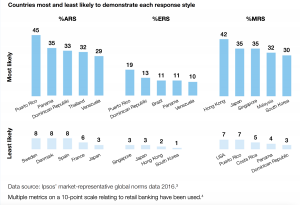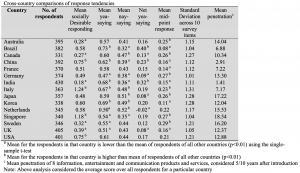-Relying on self-reported data adds a potential for bias in research. Understanding response tendencies and potential influencers of survey results is paramount for market researchers to generate meaningful insights.
International market research can be challenging, as respondents from different countries and cultures likely have different response tendencies. Behaviors and beliefs vary by demographics, for example, Gen Z’s more commonly believe they will sooner switch jobs than do millennials1, Twitter users are more likely to be male than female2, and COVID vaccinated individuals are more likely to be optimistic about the future compared with non-vaccinated ones.3 As expected, attitudes and opinions are heavily influenced by the geography and cultural background of a person. These attributes can be captured and measured through various qualitative and quantitative methodologies, and when demographic-based variances in data match up with real world differences between two groups, you can obtain meaningful, insightful results. However, the problem arises when you identify differences that do not correlate with real-world opinions or behaviors and instead are a result of how different demographic groups respond to research questions.
The reality is that respondents take and answer surveys differently based on their geography and culture, irrespective of the survey context, we refer to this often content-agnostic response phenomenon as response style, response biases, or response tendencies.
There are five response tendencies to be mindful of while conducting international market research:
- Socially Desirable Responding (SDR): Socially desirable responding refers to the tendency of respondents to reply in a manner than will be viewed as favorable by others.5 For market research, this means over-reporting favorable attitudes while under-reporting unfavorable ones. Differences in SDR can often be mistaken for differences in a measured consumer trait across various groups.4
- Acquiescence Responding (ARS)/ yea-saying: The tendency to agree with survey items or offer positive responses regardless of content. Yea-saying can throw off survey scales and lead to over-reporting of a trait or an overestimated positive response to a product feature.6
- Disacquiescence Responding (DARS)/ nay-saying: The tendency to disagree with survey items or offer negative responses regardless of content. Nay-saying can also throw off survey scales and lead to under-reporting of a trait or an overestimated negative response to a product feature.6
- Extreme Response Styles (ERS): The tendency to select the more extreme ratings on a scale, either higher or lower ones, as opposed to the middle ratings. Ex: 1-2 or 6-7 on a seven-point Likert scale.7
- Middle Response Styles (MRS): The tendency to select the more middle ratings on a scale as opposed to the extreme ratings. Ex: 3-5 on a seven-point Likert scale. 7
When comparing results of cross-national survey data, these tendencies offer a potential source of bias in the analysis as the likelihood of respondents adhering to these tendencies differs greatly amongst different countries. For example, Ipsos’ 2016 study on global norms identified that in general, Latin American countries had higher rates of acquiesce responding as well as extreme response styles, while Asian countries were more likely to opt for mid-responses on a scale.7

Additionally, a 2010 study into cross-national response biases in surveys found higher rates of SDR in Italy, Singapore, China, and the US compared to other countries tested.4

So, as a market researcher, what can we do about it? Here are a few ideas researchers can do to lessen the effect of culture-based research tendencies:
- For both qualitative and quantitative research, be cognizant of these potential sources of response bias when comparing data across different countries and cultural backgrounds
- For survey data with a large sample, consider standardizing or adjusting means either by groups or on an individual level by taking the means across multiple variables
- For survey design, consider adding additional questions surrounding expectations and unmet needs to try and gain more insight into respondent tendencies and create additional variables to track findings against
- When analyzing results, compare changes in data or against benchmarks such as comparing competitor products within a specific country and then looking at how this comparison differs across multiple countries
- Incorporate longitudinal studies into the survey design which allow for comparisons within a country over time
- Consider survey language, cultural-specific terms, and slang – especially when conducting international surveys in multiple languages
- During 1-on-1 qualitative discussions, ask follow-up questions and provide specific examples or prompts for more information behind initial responses
Market research is an adaptive field which constantly refines methodologies and uncovers new trends. It is important to mindful of a study’s design and the likely responses it will lead to in order to generate the best data and richest insights. This is what Cadence strives for and has successfully done for over 13 years.
Please contact me if you have questions or comments on this post or would like to know more about how Cadence Communications & Research can help you.
- (2021). A call for accountability and action. The Deloitte Global 2021 Millennial & GenZ Survey. https://www2.deloitte.com/content/dam/Deloitte/global/Documents/2021-deloitte-global-millennial-survey-report.pdf
- (n.d.). 2022 marketing statistics, Trends & Data – the ultimate list of Digital Marketing stats. 2022 Marketing Statistics, Trends & Data – The Ultimate List of Digital Marketing Stats. Retrieved April 5, 2022, from https://www.hubspot.com/marketing-statistics
- (2021) A time for hope: Consumers’ outlook brightens despite headwinds. Highlights from PwC’s December 2021 Global Consumer Insights Pulse Survey. https://www.pwc.com/gx/en/consumer-markets/consumer-insights-survey/november-2021/gcis-placemate-december-2021.pdf
- TELLIS, G. J., & CHANDRASEKARAN, D. (2008). Does Culture Matter? Assessing Response Biases in Cross-National Survey Research. USC Marshall School of Business – Marshall Research Paper Series Working Paper MKT 19-10. https://deliverypdf.ssrn.com/delivery.php?ID=619020093024124100120102029101119123102005063047062066086000017112082092091090089088027001040125108012013091010087085108127017021052054085039030066068094014119030090014087113003006089019118003005021115027002098024006001004009007019000125104114099005&EXT=pdf&INDEX=TRUE
- He, J., van de Vijver, F. J., Dominguez Espinosa, A., Abubakar, A., Dimitrova, R., Adams, B. G., Aydinli, A., Atitsogbe, K., Alonso-Arbiol, I., Bobowik, M., Fischer, R., Jordanov, V., Mastrotheodoros, S., Neto, F., Ponizovsky, Y. J., Reb, J., Sim, S., Sovet, L., Stefenel, D., … Villieux, A. (2014). Socially desirable responding. Cross-Cultural Research, 49(3), 227–249. https://doi.org/10.1177/1069397114552781
- Baumgartner, H., & Steenkamp, J.-B. E. M. (2001). Response styles in marketing research: A cross-national investigation. Journal of Marketing Research, 38(2), 143–156. https://doi.org/10.1509/jmkr.38.2.143.18840
- Moss, F. & Vijayendra, B. (2018). When difference doesn’t mean different: Understanding cultural bias in global research studies. https://www.ipsos.com/sites/default/files/ct/publication/documents/2018-07/cultural_bias-2018.pdf





